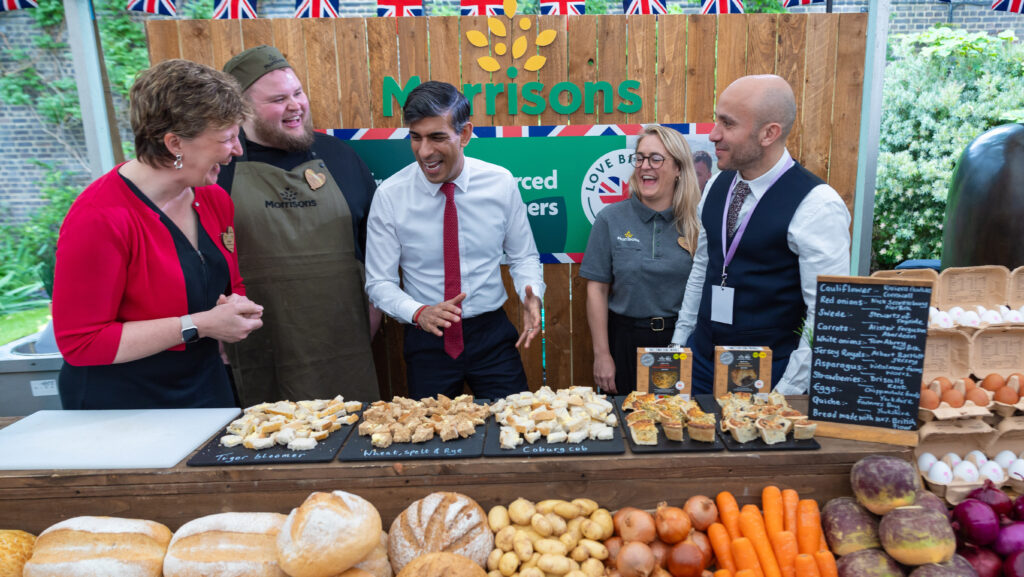This Week in Farming: Farm to fork summit, Welsh policy and disease
 © Simon Walker/No 10 Downing Street
© Simon Walker/No 10 Downing Street Welcome to another edition of This Week in Farming, your regular round-up of the best content from Farmers Weekly and FWi over the past seven days.
Farm to Fork Summit
There is little doubt that the key event of the week has been the second Farm to Fork Summit held at 10 Downing Street, hosted by prime minister Rishi Sunak and attended by almost 100 representatives from the food and farming industry.
With an election in the air and shed loads of money to spend following three years of Basic Payment Scheme (BPS) cuts in England, it was little surprise to see a number of policy announcements, backed up with a bit of cash.
These included an £80m blueprint for the horticulture sector, a £75m fund to support drainage boards (OK, that one was previously announced), and a £72m fund for a new endemics disease scheme.
The egg sector also welcomed a £22m commitment to help upgrade bird housing, while the small abattoir sector gained another £3m to help its survival.
Defra also agreed to show greater leniency to farmers struggling to meet their agri-environment scheme conditions due to wet weather issues.
Welsh delays
On the same day, the Welsh government was also in action on the policy front, with rural affairs secretary Huw Irranca-Davies announcing another one-year delay to the planned Sustainable Farming Scheme.
The announcement was welcomed by farm unions, coming off the back of significant protests in recent weeks.
A smaller protest was held in Cardiff on the same day, organised by grassroots body Welsh Farmers Unite, timed to coincide with World Farmers Day.
The decision to delay the Sustainable Farming Scheme until 2026 and hold further talks means Welsh farmers will benefit from another year of full BPS money in 2025, while English farmers face a fourth year of cuts.
Clarkson effect
The massive interest in the third series of Clarkson’s Farm provided ample material for Farmers Weekly editor Andrew Meredith in this week’s Editor’s View column.
Striking the right balance between Jeremy’s “Labrador-like enthusiasm” for trying new things and Kaleb’s innate sense of caution is key to success, he says.
With the second batch of episodes released last weekend, Ocado reported a significant upturn in sales of British food through their “Buy British” portals.
Despite tear-inducing sections of the programme dealing with piglet mortality, the online retailer reported a spike in sales of pork products, including pork chipolatas (+134%), gammon (+42%) and Packington free-range pork loin (+42%).
This good news was tempered by supermarket Morrisons’ decision to drop its previous commitment to only sell British lamb in its stores.
Pests and diseases
As ever, the threat of pests and diseases was in the air this week, both for crops and livestock.
Mark Bollebakker, senior field trials manager at AHDB, pointed to high levels of light leaf spot in oilseed rape crops, representing a potential threat to yields.
He advised careful management through use of fungicides over the next few weeks.
Geoff Hailstone, UPL potato expert, also warned of the impending demise of active ingredient mancozeb, needed tor controlling potato blight.
The final date for the sale and supply of all products containing mancozeb will be 30 November 2024, and all product must be used up by 30 November 2025.
Concerns about the spread of bovine TB in Northern Ireland grew this week, with news that 21% of badgers found dead on the roadside were found to be TB-positive.
Meanwhile, a new pilot project in Scotland is seeking to counter predation by pesky sea eagles, training dogs to guard against unwanted attacks.
Up corn, down horn
The old adage, “up corn, down horn” was in evidence this week, with grain and oilseed prices showing marked improvements as harvest draws closer, and beef values slipping.
Ex-farm oilseed rape reached £383/t mid-week off the back of tight EU supply concerns, while feed wheat pushed ahead of the £200/t mark for new crop.
Analysis by business editor Suzie Horne delved deeper into the factors driving the markets for the coming weeks.
The picture was slightly less rosy for cattle finishers as “summer nerves” saw prices fall to 480p/kg deadweight. Values now tracking below year-ago levels.
Listen to the FW Podcast
Don’t forget to listen to the latest edition of the Farmers Weekly podcast with Johann Tasker and Sandy Kirkpatrick online.
Alternatively, bring us with you in the cab by downloading it from your usual podcast platform.
